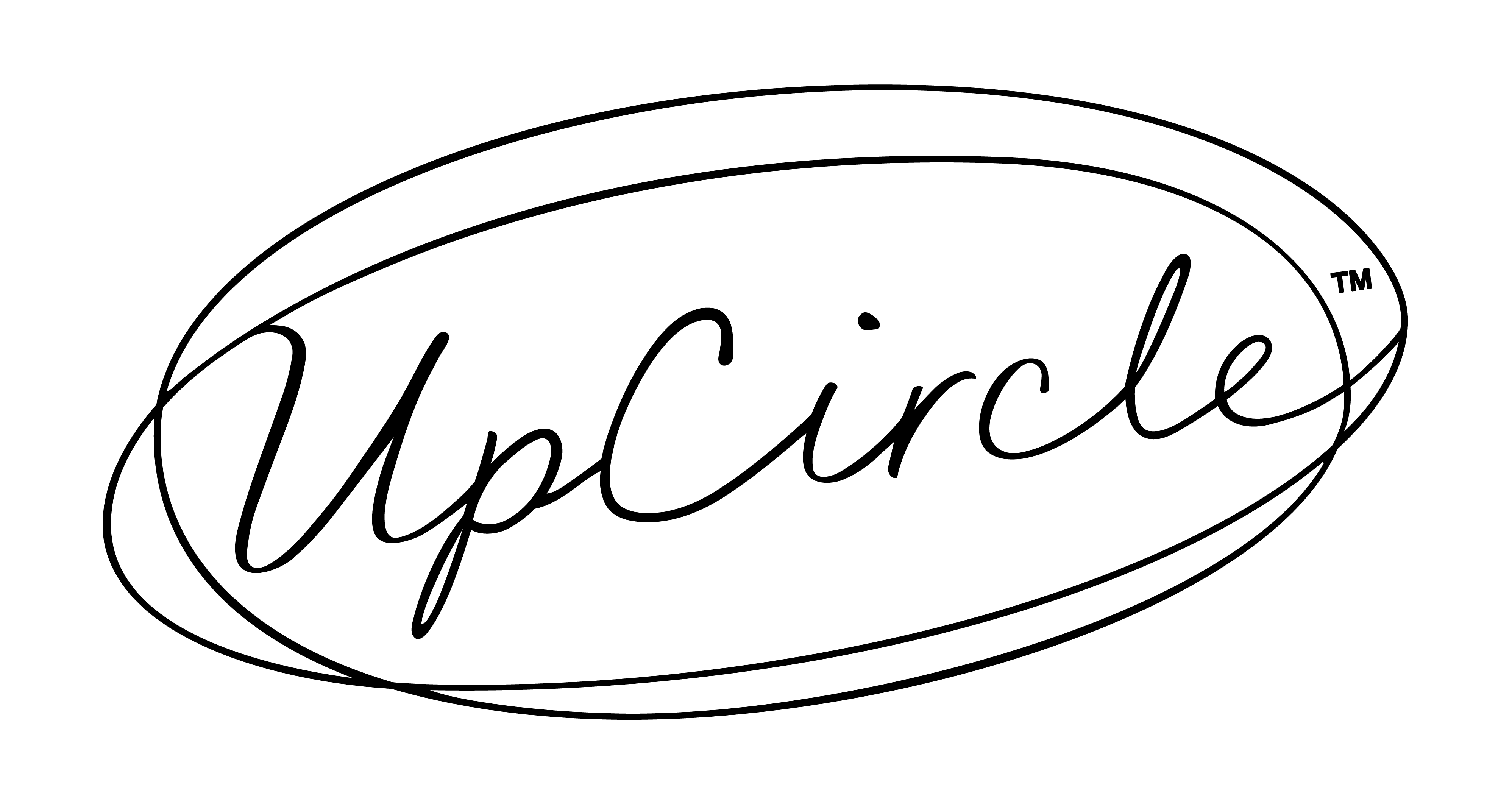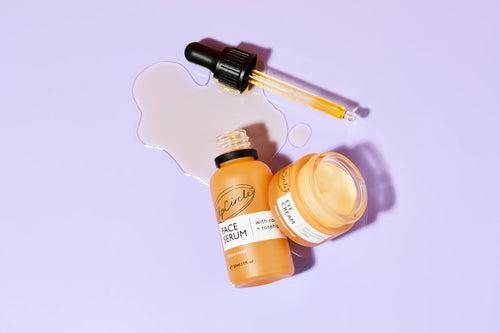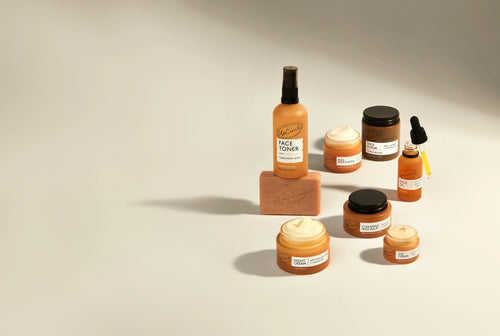The world of skincare is complex, and it’s only getting smarter. Biotechnology (biotech) is an exciting, innovative approach to skincare that we love, gaining momentum worldwide.
We know it might sound incredibly science-y, but biotech doesn’t have to be complex. The basis of biotechnology in skin care lies in combining natural processes with science (such as fermentation and cell culturing) to create more effective products with more potent benefits. This paves the way for lab-grown actives and biomimetic ingredients that emulate the skin’s natural functions.
Think of it this way: instead of crushing a ton of plants to extract a little bit of the good stuff, scientists can now create and enhance those same powerful ingredients in a lab. The result? High-performance skincare that’s kind to both your skin and the planet.
How biotechnology can be incorporated into skincare
Admittedly, it still does sound futuristic, but you’ve likely already heard of some of the ways it can be incorporated into your skincare.
1. Lab-grown collagen
For any seasoned skincare user, you’ll probably know how useful collagen is for both skin and hair. Skin-wise, collagen is a wonderful ingredient that works to help improve skin elasticity, to keep your skin feeling supple and firm.
It’s also a wonderful hydrator, helping to prevent dry, flaky skin. This, in turn, helps to protect the skin’s essential natural barrier. This barrier works hard to keep your skin hydrated and moisturized, while preventing damage from pollution or other external irritants.
However, traditional collagen often comes from animal sources – meaning that products that use it aren’t compatible with some people’s ethics. That’s where biotech comes in; biotech collagen is lab-grown using fermentation and bioengineering.
Scientists use microbes like yeast or bacteria that have been programmed to produce collagen, much like how your body naturally makes it. Biotech versions are grown in labs using plant-based fermentation. They’re cruelty-free, more sustainable, and as effective – if not more effective – at smoothing wrinkles and plumping skin.
2. Probiotic skincare
You’ve probably heard of probiotics for gut health and seen them all over social media – it turns out, your skin loves them too!
Biotech uses ‘good bacteria’ to support your skin barrier, calm inflammation, and fight acne. Probiotics can improve skin hydration and moisturisation by reducing transepidermal water loss (TEWL). They can help protect the skin from damage caused by environmental factors like pollution and UV radiation, but this is never a substitute for a high-performance SPF.
3. Fermented ingredients
Biotechnology allows ingredients like rice, algae, mushrooms, and plant extracts to be fermented to boost their power. These ingredients are broken down using microorganisms in a controlled, scientific environment.
Ingredients like fermented rice, soy, and algae extracts all work well to boost hydration, antioxidants, and elasticity in the skin. That’s why they’re commonly used in skincare products like moisturizers and cleansers.
Retinol can be formulated through microbial fermentation, with identical efficacy to non-biotech-produced retinol, as a sustainable alternative to synthetic retinol.
Squalane is a highly refined botanical oil with a structure that’s similar to our natural moisturizers: lipids. It’s typically derived from plant sources like olives, sugarcane, and rice bran, as well as animal sources like shark liver oil – meaning it’s not suitable for some people to use.
Now, we didn’t make a typo – squalane and squalene are different things. Squalene is the moisturising lipid naturally produced in your skin, and squalane is a derivative, hydrogenated version of squalene. Using biotech, squalane can be produced by fermenting sugarcane, making it suitable for vegans.
Biotechnology enables a stable supply, consistent quality, and low impact (no animal use, avoids deforestation) ingredient that supports your skin barrier.
On the topic of fermented ingredients, we do actually have a brand new product in the works that will make use of these incredible ingredients. Stay tuned!
How we use biotech in our products
At UpCircle, we pride ourselves on finding innovative ways to bring you top-quality skincare. We use biotechnology to ensure that when we use ingredients like collagen, it’s produced ethically.
Peptides in our serum
Biotechnology can be used to generate stabilized vitamin C, 3-o-ethyl ascorbic acid, which is present in our Peptide Serum with Custard Apple + Blood Orange.
Revitalising and restoring, our peptide serum is clinically proven to improve skin elasticity. It boosts collagen and improves hydration, working to help regenerate skin and heal scars.
Why is biotechnology important?
Many people have historically had mixed views about biotech. Some people were wary of ‘unnatural’ lab ingredients, but now, the desire for ethical and eco ingredients has driven greater acceptance and adoption of biotech formulations.
According to a global survey by Givaudan, when consumers were given a clear definition of biotechnology – ‘creating high-performing ingredients from natural biomass via a biological process’ – interest jumped dramatically.
As consumers become more conscious of the ethical and sustainability impacts of their products, routines start to incorporate more biotech.
Sustainability benefits are considerable: biotech drastically reduces dependence on land, water, and animals, helping the industry meet climate and biodiversity targets. At the same time, these ingredients are becoming scalable, cost-effective, and globally accessible.
Back to the technical stuff – these innovations are reshaping global skincare trends, with consumers increasingly seeking science-backed natural products. Biotech ingredients offer a ‘natural’ origin, while also delivering proven performance. Industry analysts have noted a shift towards ‘ingredient-led’ consumerism, with people prioritising efficacy and ethics.
Crucially, biotech ingredients are engineered to work in harmony with the skin. It offers targeted, biomimetic action that translates into real, measurable results. Backed by growing clinical evidence, biotechnology is enabling the next generation of formulations that are effective, ethical, and environmentally responsible.
At UpCircle, we’re firm believers that the future of skincare will be shaped not only by what we take from nature but by how intelligently and responsibly we replicate it.
Discover our full collection of ethical, vegan skincare and haircare.







